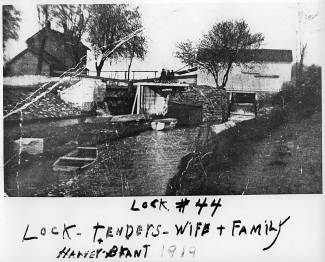Collection Name
About
Lock 44 locktender and family - Harvey Brant
Harvey Brandt tended Lock 44 at Williamsport from 1916 to 1924 when the canal closed. He and his wife continued to live in the lock house until 1961. He was paid $22.50 per month to tend lock twenty-four hours a day, seven days a week and rented out canoes to tourists to subsidize his income (Craig Williams. "Canal lock tender remembers busy days". Morning Herald, 9-26-1985).
Lock 44 was one of a number of locks with a building over the bypass flume on the berm side of the lock. In this case it was a carpenter shop. In 1862 this was one of seven locks that had dry docks for the repair of boats adjacent to them. Some locks were damaged by actions during the Civil War more than once, and this was one of them. In September 1862 as the Battle of Antietam was being fought, McClellan sent Captain Charles Russell of the 1st Maryland Cavalry to burn the pivot bridge over the lock to prevent its use by the Confederates. On another occasion all four of the lock gates were burned.
In 1875 there was a grocery store here, according to Boyd's Business Directory of Maryland. Embry C. W. & Co. Lock 44 Williamsport. Grocers to Hides, Leather & Findings
Mile 99.3
A lock is a chamber used to lift or drop water levels in order for a boat to move across elevation levels. There are 74 lift locks that rise 605 ft from Georgetown to Cumberland. The locks were tended by lockkeepers that would operate the locks for the canal boats that would arrive at any time of the day on their way either to Georgetown or Cumberland. Materials used to build the locks ranged from Aquia Creek Freestone, Granite, and Seneca stone to wood and cement on the upper composite locks. The locks would also be a place for canallers to trade or buy supplies that they would need for their long journeys.
